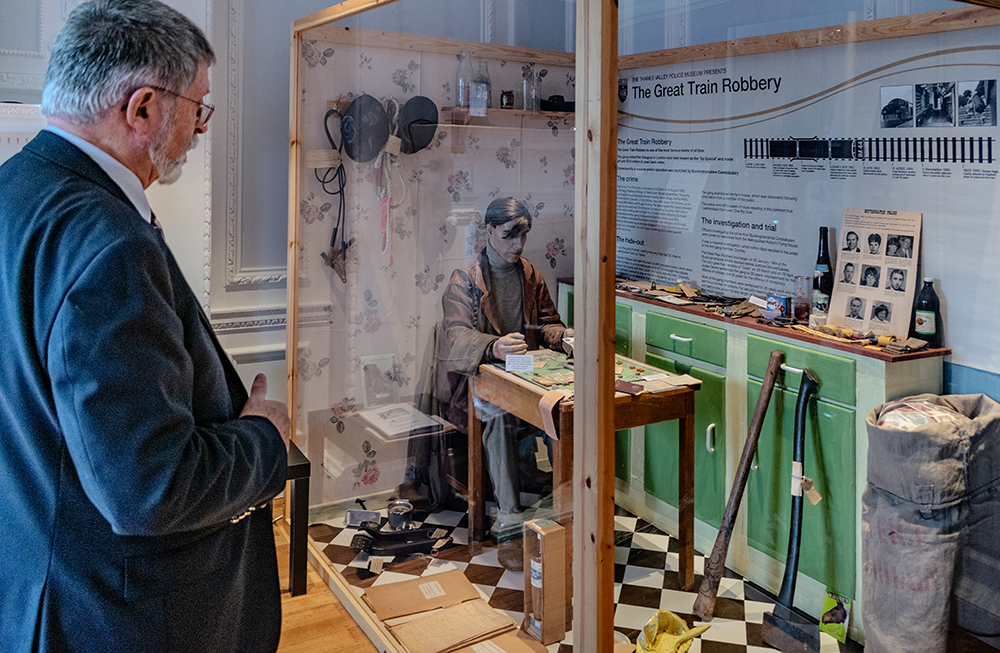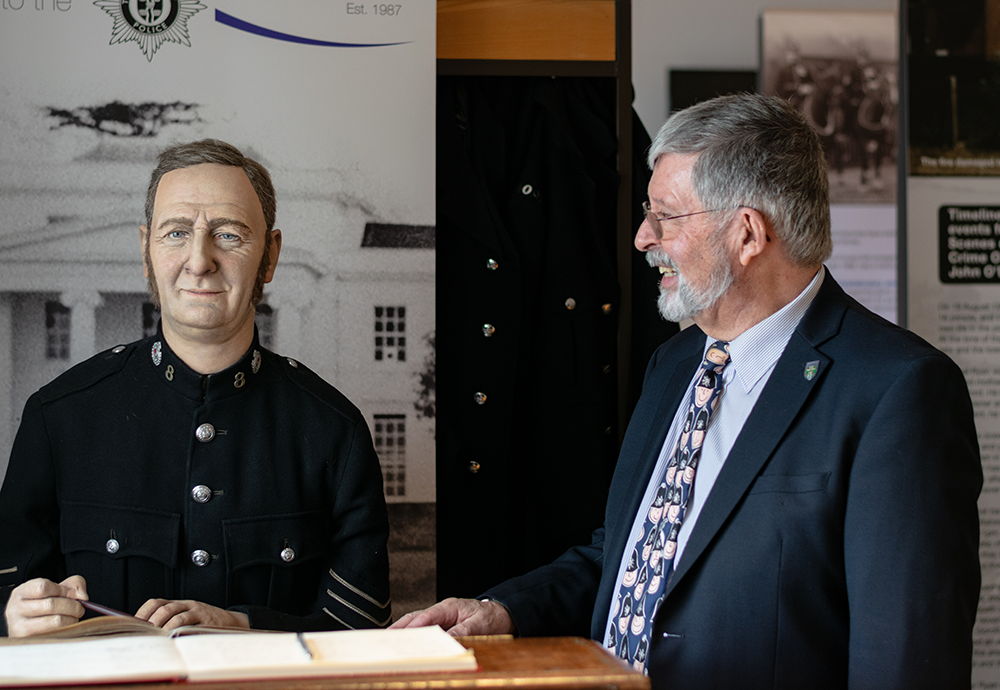A Life of Crime Prevention – from the beat to volunteering
We recently met with Dave – a veteran of the police, who is now giving back to policing in his role volunteering at the TVP museum at Sulhamstead. Dave’s policing career actually started with The Met, and he shared some information on why he first applied to be a police officer.
I was a passionate scout as a youngster – I liked the freedom, the self-reliance, and I liked that I could go out and make shelters and cook on open fires. I knew I didn’t want a job in an office, nine to five indoors.
When it came to embarking on his career, for Dave the choice was pretty simple.
I didn’t want to join the army and train to go off and kill people, but I knew I wanted a structured job with discipline. Joining the police was the only job I ever applied for!
Work as an officer in The Met the late 60s involved a lot of standing at embassy doors (prior to the formation of the Diplomatic Protection Unit), and while London could be exciting, Dave wanted to “be a policeman”.
After 3 years of working in London he transferred to the Thames Valley and settled in Newbury where he’s remained ever since. Finding that his passion lay in crime prevention, rather than simply picking up the pieces after an incident, in his own words:
You can never put the pieces back after someone has been a victim of crime – even if we catch the offender and they get justice, the victim will still feel violated. That’s why my passion has been about preventing it from happening in the first place.

Dave was delighted to be offered a full-time role as a Schools Liaison Officer in the 1980s, throwing himself into the role, even enrolling at a local college to get a teaching certificate.
Sadly, the role didn’t last forever. ‘Tenure of post’ was introduced – being in a specialist post for five years was seen as “getting too comfy” so Dave went back out in the rain, until a new role that nobody had heard of came up. With his drive to prevent crime, Dave seemed a perfect fit for the new Architect Liaison Officer post. The role was designed to look how the built environment contributed to or discouraged crime. Despite the job title, it turned out that architects actually had very little to do with designing estates – but all the right people were engaged, including developers, planning departments, and builders.
We kept very tight records of new estates. There was as much as 80% less crime on accredited ‘secured by design’ estates.
Since retiring, Dave now volunteers at the museum found in the White House at Sulhamstead, as well as going out in the field giving talks. After our meeting he was due to visit an over-55s group to give his talk “A Life of Crime Prevention.” It gives him an opportunity to speak to the public differently from your typical police interaction.
The only time people usually deal with the police is where there is some element of confrontation or stress, so the museum is a lovely environment to chat to people without that.
Those chats can often take on unexpected dimensions…
One thing I talk to young kids about is the Doctor Who ‘police call box, as it was the only way to keep in contact with the police station when I was on the beat. It was called the beat because officers used to beat their staff as they walked around so people would know they were there, and each beat had a Doctor Who box! Kids are shocked when I tell them that – they thought it was to travel to another dimension!
But how did Dave come to volunteering at the museum in the first place?
My personal involvement with the museum went back a long time before retirement – it was always a fundamental element of the work experience courses I used to run when I was school’s liaison officer for Newbury and ran a week’s immersion for 6th formers interested in a police career. Even earlier when I was ABO at Newbury, I often brought cub packs and youth groups to visit – and borrowed exhibits for school history projects.
For Dave, policing is one of those roles where you need have that innate self-discipline, and he’s in agreement that the self-discipline is part of the reason he has kept volunteering.
Yeah – and it’s personal reasons for me too. But when I talk to people, I am so proud of my service. To me that’s an enormous sense of satisfaction, knowing that my work has prevented crime and kept people safe. Now, I couldn’t detect my way out of a paper bag, which is why crime that has already happened frustrates me. To me, volunteering at the museum is a lovely way to occupy a few hours during retirement.
Of course, his decision to volunteer at all was multi-faceted…

When retirement came – unexpectedly, as a result of the austerity cuts of 2010, despite my bitterness with the way the job had been ‘dumped on’ by the powers that be, I still felt a great deal of pride, not only in my own personal contribution to the safety and security of the communities I had served, but in the way I had seen the service morph over 40 years to meet the challenges of the 21st century, and to tell some of the stories I had been personally involved with over that time.
I saw volunteering at the museum as an important way I could maintain that pride and the enjoyment of ongoing contact with the public, and to continue the ‘storytelling’ that public relations involve with all elements of the community.
To be frank, this was not without some element of domestic opposition, as my late wife – who had given much herself to TVP (unpaid and un-thanked) over many years, felt this was now time for us, and that policing could be left in the past.
However, by carefully rationing attendance, I was able to retain valued contact with old colleagues and keep the memories and stories alive – vitally important after a lifetime of involvement with what had always been more of a vocation than a career.
A decision which was to prove literally a lifeline when she died quickly and unexpectedly just after our 50th wedding anniversary, and if I had not had that circle of links and old colleagues to fall back on – informally, but with the kind of practical and not over emotional back up that anyone who has been part of a disciplined uniform service – emergency or otherwise, will know and relate to instinctively.
Having lost the main rock of my life – and you do need something else outside of your children and family when such loss happens – I was never so glad that my other driving force and chief topic of professional interest and conversation, was still so readily available.
Once retirement happens, many people fear and feel that the world is moving on and leaving them behind. A lifetime in uniform can leave retirees feeling a bit ‘institutionalised’ and without much else in the outside world to relate to. Coming to the museum not only greatly helps to bridge that gap, but the pleasure of meeting new young officers and hearing how the service is adapting and changing, greatly enhances the sense of pride in how brave and adaptable our successors are in dealing with challenges that would have been unthinkable 30 years ago. It provides great fodder for head shaking conversations in the pub later about how the world is going to the dogs, and ‘they wouldn’t have got away with that in our day!’ Which all pensioners from any walk of life thrive on.
So, what would Dave tell someone that was thinking of volunteering with Thames Valley Police after their retirement?
For someone that’s built up a lifetime of experience, do you just want to switch that off? Some people do – and that’s fine – I can perfectly understand if people want to go and sit in the sunshine. But you have a lifetime of stuff you can pass on to other people – and with something like the museum, you are dealing with the public in a non-confrontational situation, with people that are interested in policing. You get to swap yarns with ‘old muckers ’. If you’re part of the police family it can be like a bereavement if that stops overnight, and volunteering can be like a pair of arms around you. If you’ve given your life to the job, the job can still give something back.
If you’re coming to the end of your career within policing, like Dave, you may well be considering your options. For those who would like to volunteer and remain an active part of the policing family, there are opportunities available. Please visit our volunteering page to learn more about volunteering at Thames Valley Police, or head to our vacancies portal for details of specific roles.


 Facebook
Facebook
 Twitter
Twitter
 Linkedin
Linkedin
 Instagram
Instagram